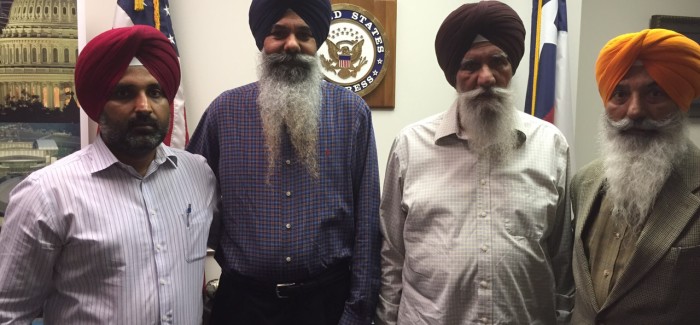Texan Sikhs Appeal to Congress to Speak for Maverick Activist on Hunger-Strike in India
Racial discrimination suspected after congressional staff repeatedly refuse to be pictured with American Sikhs
Houston, TX: May 18, 2015 – The cause of a determined Californian on the 123rd day — as of Monday — of a hunger-strike in India for release of political prisoners is galvanizing South Asian diaspora throughout the United States to approach their congressional representatives to ask they speak in honor of Surat Singh Khalsa.
On May 12, a delegation led by Houston-resident Surjit Singh visited the offices of Texas Congressmen Al Green (D-Houston) and Pete Olson (R-Sugarland) to deliver an info packet about Khalsa (on hunger-strike since January 16) and ask them to formally recognize his democratic protest. Reporting on his visit, Singh states: “We explained to them about Bapu Surat Singh’s struggle and asked them to take a picture with us, but they refused. Olson’s office would not take a picture at all, and Green’s office took a picture but would not appear with us.”
Appeals to U.S. Congress on Khalsa’s behalf are also being taken up in California, where his daughter Devinderdeep Kaur accompanied a delegation on May 13 to visit four congressional offices. “We faced the same issue of racial discrimination against Sikhs in two offices we visited last Wednesday,” says Pieter Friedrich, a member of the delegation. “Staff for Representatives Mike Honda and Anna Eshoo both refused to be pictured with us and appeared strangely nervous at hearing the request from American Sikhs. Whether this is discrimination or an office policy, it is unfortunate that the ears of Congress are so deadened to human rights that they won’t even allow activists to document their visits.”
Khalsa is an immigrant to and permanent resident of the United States who fled India in 1988 to escape religious and political persecution. “The last straw for this maverick activist was being shot by police when they started firing at random into a demonstration outside the Punjab Legislative Assembly,” suggests Bhajan Singh, Founding Director of Organization for Minorities of India (OFMI). “The United States has served as a beacon of liberty to the rest of the world since its founding, so we have hope that the government will not allow Californian Bapu Surat Singh Khalsa to die in vain. I urge diaspora everywhere in this country to approach the U.S. Congress and ask them to honor him and speak against the persecution of people for their political and religious beliefs.”
Seven California congressional representatives (Jeff Denham, John Garamendi, Mike Honda, Zoe Lofgren, Tom McClintock, Jerry McNerney, and Patrick Meehan) issued a letter to the U.S. State Department on April 15 asking it to “assist” Khalsa and his son, Ravinderjit Singh Gogi (an American citizen). Gogi was then imprisoned for visiting his father, who was detained and force-fed by police. The letter, as well as outcry from senior leaders of Punjab state’s Bahujan Samaj Party (BSP), influenced their release from police custody in late April.
Steve Macías, an OFMI advisor who joined the California delegation on Wednesday, remarks: “We hope to encourage Congressional voices to speak loud for Khalsa and his struggle for release of political prisoners who were mostly arrested for dissent after the Indian State conducted a genocide against Sikhs in 1984.” The prisoners have served their court-appointed sentences, are eligible for release, but remain imprisoned. Among other actions, OFMI is circulating a petition requesting action on the issue from Congressman Joseph Pitts (R-Pennsylvania), who is co-chair of the House of Representatives’ Human Rights Commission.
Khalsa’s family will join community leaders from the South Asian diaspora at a rally outside the California State Capitol in Sacramento on May 22.


